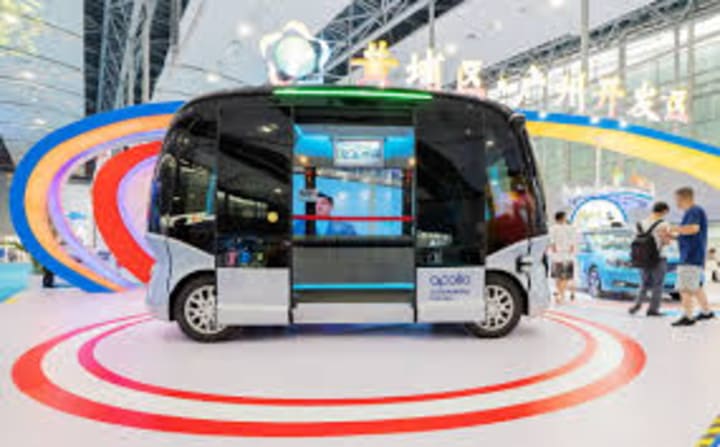The Autonomous Revolution: Self-Driving Taxis Redefining Transportation in China
China's robot taxis: Would you ride in one?
Self-driving taxis have become a reality in China thanks to AI, with Baidu leading the way as the first company to operate fully autonomous taxi services in Beijing and plans to expand its fleet.
Introduction to Self-Driving Taxis in China

China's pioneering efforts in self-driving taxis have revolutionized the transportation industry, showcasing remarkable advancements enabled by artificial intelligence. Baidu's achievement of being granted the first license to operate fully autonomous taxi services in Beijing signifies a significant leap towards a future where self-driving vehicles are commonplace on the roads. This milestone not only highlights China's technological prowess but also sets a precedent for other countries looking to adopt autonomous transportation solutions.

The relentless expansion of autonomous vehicle services in major Chinese cities reflects the country's dedication to innovation and sustainable urban mobility. For instance, Baidu's autonomous ride-hailing platform, Apollo Go, has already started accepting fares in a 60 square kilometer area in Beijing with a fleet of 10 driverless taxis, a testament to the rapid deployment of this transformative technology. As China continues to lead the way in autonomous driving technology, the vision of fully autonomous and interconnected transportation systems is becoming increasingly tangible, promising a future where commuting is safer, more efficient, and accessible to all.

Advancements in Self-Driving Taxi Technology
In the realm of self-driving taxis, Pony.ai has emerged as a prominent innovator, revolutionizing the transportation landscape in China. By introducing a cutting-edge app tailored for hailing autonomous taxis in Nansha, Guangzhou, Pony.AI has set a new standard for convenience and accessibility in the industry. This development not only streamlines the process of booking self-driving rides but also showcases the seamless integration of advanced technology into everyday commuting experiences, marking a significant milestone in the evolution of autonomous vehicles in China.

The exclusivity of Pony.ai's app, initially limited to employees and VIPs and cleverly integrated into the ubiquitous WeChat platform, highlights the company's strategic approach to introducing self-driving taxis to the market. This targeted launch not only ensures a controlled testing phase but also paves the way for the gradual expansion of services to a wider audience. By focusing on user experience and safety, Pony.ai is shaping the future of urban transportation, where self-driving taxis are poised to play a central role in sustainable and efficient mobility solutions across Chinese cities. This forward-looking approach aligns with the company's vision to enhance the overall transportation ecosystem through the widespread adoption of autonomous technologies.

Benefits of Self-Driving Taxis in China
In addition to the advantages mentioned, self-driving taxis in China also contribute to environmental sustainability. By optimizing routes and reducing unnecessary stops, autonomous taxis help decrease fuel consumption and lower carbon emissions, aligning with China's commitment to green transportation initiatives.

Furthermore, the integration of self-driving taxis into existing transportation networks in China promotes the concept of shared mobility. This model encourages multiple passengers to share rides, reducing the number of vehicles on the road and alleviating traffic congestion in densely populated urban areas. Through shared autonomous transportation, China aims to enhance the overall efficiency of its transportation infrastructure while minimizing the environmental impact of traditional transportation modes.
Overall, the introduction of self-driving taxis in China not only revolutionizes the way people commute but also addresses key challenges related to accessibility, safety, environmental sustainability, and traffic management. By embracing cutting-edge technologies and innovative solutions, China's autonomous taxi services pave the way for a smarter, greener, and more interconnected future of urban mobility in the country.
Challenges in Implementing Self-Driving Taxis in China
The integration of self-driving taxis into China's transportation landscape presents a myriad of challenges that must be navigated to ensure a smooth transition to autonomous mobility solutions. One of the primary hurdles is the need to address cybersecurity concerns stemming from the complex nature of autonomous vehicle technology. Ensuring the safety and security of the systems controlling self-driving taxis is paramount to prevent potential cyber threats that could compromise passenger safety and data integrity.
Moreover, the seamless integration of autonomous taxis with existing public transportation systems poses a significant challenge in China. Coordinating self-driving taxis with traditional modes of transport such as buses and subways requires sophisticated infrastructure and communication networks to enable a cohesive and efficient mobility experience for passengers. Developing interoperable systems that allow for a seamless transition between different modes of transportation will be crucial for the success of self-driving taxis in urban environments.
Another critical challenge in the implementation of self-driving taxis in China is the development of robust systems capable of handling adverse weather conditions. China's diverse climate, ranging from heavy rain to snowstorms, presents a testing ground for autonomous vehicles that must operate safely and effectively in all-weather scenarios. Overcoming these challenges through rigorous testing, technological innovations, and strategic partnerships will be essential to the widespread adoption of self-driving taxis across different regions in China. By proactively addressing these obstacles, China can solidify its position as a global leader in autonomous transportation technology.
Comparison with Global Self-Driving Taxi Initiatives
China's advancements in self-driving taxis position it as a frontrunner in revolutionizing the transportation industry on a global scale. For instance, Baidu's Apollo Go service, which was the first to receive a license for fully autonomous taxi operations in Beijing, symbolizes China's proactive stance in embracing cutting-edge technology for public mobility. This early milestone has propelled China to the forefront of self-driving taxi services, setting a precedent for other countries to follow.
In contrast, while the United States and Europe have also made significant strides in self-driving taxi technology, China's scale and pace of implementation are unmatched. For example, Baidu's ambitious plans to expand its autonomous vehicle services to 65 cities by 2025 and 100 cities by 2030 demonstrate the country's long-term vision for widespread adoption of self-driving taxis. This strategic outlook not only showcases China's commitment to technological innovation but also highlights the potential for self-driving taxis to become a ubiquitous mode of transport in the near future.
Future Expansion Plans and Technological Developments
Looking ahead, Baidu's Apollo Go not only serves as a pivotal research and development hub for self-driving vehicles in various Chinese cities, but it also symbolizes a transformative phase in the transportation sector, marking a shift towards autonomous mobility solutions. As Baidu continues to advance its autonomous taxi services, the company's innovative approach is propelling China to the forefront of self-driving technology on a global scale. For instance, Baidu's strategic plans to expand its Apollo Go services to 65 cities by 2025 and 100 cities by 2030 demonstrate a concerted effort to revolutionize urban transportation and enhance the overall mobility experience for users.
Moreover, the exponential growth projected in the autonomous car service market in China, exceeding 1.3 trillion yuan, not only signifies a lucrative business opportunity but also reflects the increasing demand and acceptance of self-driving taxis among the Chinese populace. This substantial market projection underscores the immense potential for self-driving taxi services to become a mainstream mode of transportation in China, reshaping the traditional concept of mobility. With Baidu's ambitious vision to establish the largest robotaxi fleet in China by 2040, the company is poised to lead the way in shaping the future of autonomous transportation and setting new benchmarks for innovation in the industry.






Comments
There are no comments for this story
Be the first to respond and start the conversation.